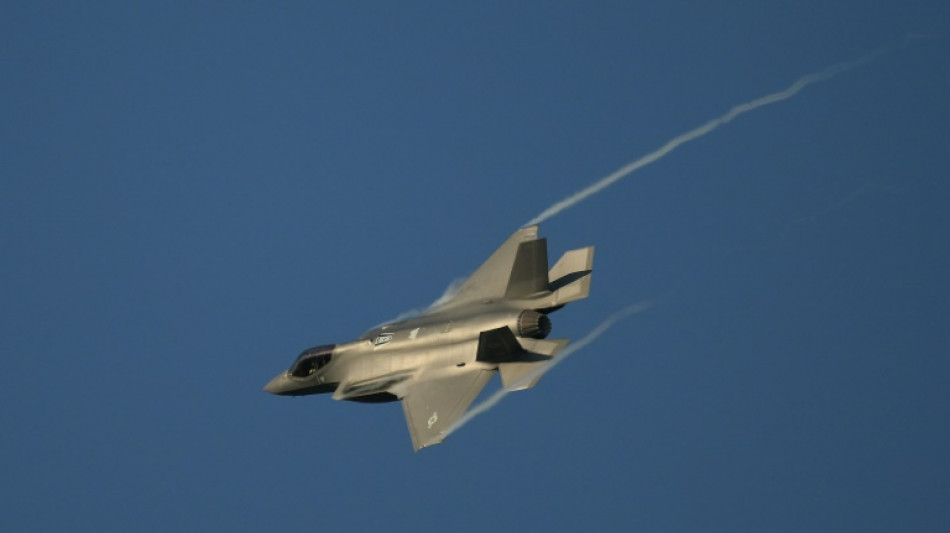
-
 AC Milan beat champions Napoli to make Serie A title statement
AC Milan beat champions Napoli to make Serie A title statement
-
Scores arrested on second day of Morocco protests: NGO

-
 'One Battle After Another' debuts top of N. America box office
'One Battle After Another' debuts top of N. America box office
-
Two dead after US shooting, fire at Mormon church

-
 Mitchell open to coaching first Women's Lions in 2027
Mitchell open to coaching first Women's Lions in 2027
-
Vagnoman sends Stuttgart past Cologne in Bundesliga

-
 Stars turn out for Armani's final collection in Milan
Stars turn out for Armani's final collection in Milan
-
Massive Russian drone and missile attack kills four in Kyiv
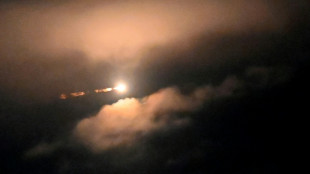
-
 Arsenal showed 'ambition' of title winners in Newcastle win: Arteta
Arsenal showed 'ambition' of title winners in Newcastle win: Arteta
-
Free Picasso park to open in Paris in 2030

-
 Barca beat Real Sociedad to top Liga as Yamal returns
Barca beat Real Sociedad to top Liga as Yamal returns
-
Arsenal strike late for 'beautiful' Newcastle win, close in on Liverpool

-
 Barca beat Real Sociedad to go top as Yamal returns
Barca beat Real Sociedad to go top as Yamal returns
-
Kildunne says 'no reason' England can't win Rugby World Cup again

-
 Arsenal strike late to beat Newcastle, close in on Liverpool
Arsenal strike late to beat Newcastle, close in on Liverpool
-
Lyon win at Lille to stay level at top of Ligue 1 with PSG

-
 Zurich votes to ban petrol leaf blowers
Zurich votes to ban petrol leaf blowers
-
Starmer warns UK Labour in 'fight of our lives' as party meets

-
 Namibia deploys 500 soldiers to fight Etosha fire
Namibia deploys 500 soldiers to fight Etosha fire
-
Ryder Cup start host steps down after expletive-filled McIlroy chant

-
 Kuldeep helps India bowl out Pakistan for 146 in Asia Cup final
Kuldeep helps India bowl out Pakistan for 146 in Asia Cup final
-
Dominant Europe on the brink of historic Ryder Cup triumph

-
 Injured Hovland withdraws from Ryder Cup as Europe moves closer to win
Injured Hovland withdraws from Ryder Cup as Europe moves closer to win
-
Roma beat Verona to join Napoli at Serie A summit

-
 Watkins sparks Aston Villa revival for first Premier League win
Watkins sparks Aston Villa revival for first Premier League win
-
Pogacar defends cycling world title with solo run

-
 No handshake again as India bowl against Pakistan in Asia Cup final
No handshake again as India bowl against Pakistan in Asia Cup final
-
Zverev downs racket-smashing Moutet in Beijing as Gauff digs deep
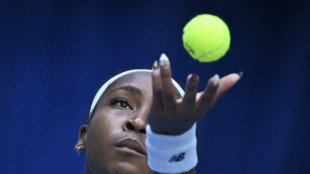
-
 Leverkusen's Schick set for spell on sidelines
Leverkusen's Schick set for spell on sidelines
-
Massive Russian missile and drone barrage kills four in Kyiv
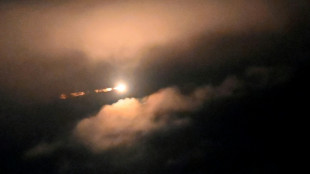
-
 Indian actor-politician's aides charged after rally stampede kills 40
Indian actor-politician's aides charged after rally stampede kills 40
-
England still have 'another peak to climb' after Women's Rugby World Cup triumph

-
 Real Madrid's Carvajal Clasico doubt after calf injury
Real Madrid's Carvajal Clasico doubt after calf injury
-
Moldova votes in tense polls, torn between EU and Russia
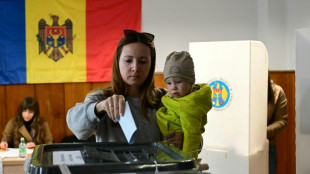
-
 Alcaraz makes light of injury to reach Japan Open semis
Alcaraz makes light of injury to reach Japan Open semis
-
Slips, salt and stripes: key looks from Milan fashion week

-
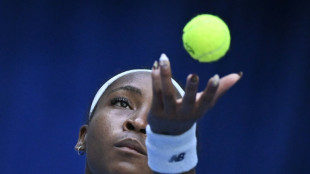 Gauff digs deep to keep China Open title defence alive
Gauff digs deep to keep China Open title defence alive
-
Russian missile and drone barrage kills four in Kyiv
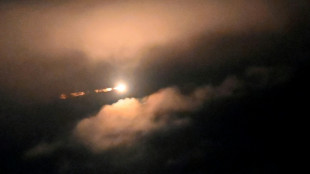
-
 Massive crowd, chaos preceded deadly India rally stampede
Massive crowd, chaos preceded deadly India rally stampede
-
Russian missile and drone barrage kills four: Kyiv

-
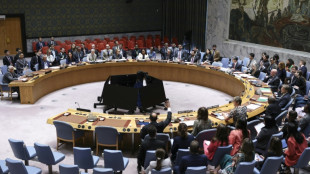 Iran denounces 'unjustifiable' return of UN sanctions
Iran denounces 'unjustifiable' return of UN sanctions
-
Emotional Marquez in tears after winning seventh MotoGP title

-
 Emotional Marquez win seventh MotoGP world championship
Emotional Marquez win seventh MotoGP world championship
-
Russia pounds Ukraine with 'hundreds' of drones and missiles: Kyiv

-
 Wallabies record-holder Slipper hints Perth could be final Test
Wallabies record-holder Slipper hints Perth could be final Test
-
Son brace fuels LAFC as Messi frustrated in Miami draw

-
 US actress-singer Selena Gomez weds music producer Benny Blanco
US actress-singer Selena Gomez weds music producer Benny Blanco
-
Pakistani parents rebuff HPV vaccine over infertility fears

-
 Women's cricket set for 'seismic' breakthrough at World Cup
Women's cricket set for 'seismic' breakthrough at World Cup
-
New Zealand fly-half Barrett out of Australia rematch


Rare earths: China's trump card in trade war with US
China is counting on one crucial advantage as it seeks to grind out a deal to ease its high-stakes trade war with the United States -- dominance in rare earths.
Used in electric vehicles, hard drives, wind turbines and missiles, rare earth elements are essential to the modern economy and national defence.
AFP takes a look at how rare earths have become a key sticking point in talks between the US and China.
- Mining boom -
"The Middle East has oil. China has rare earths," Deng Xiaoping, the late Chinese leader whose pro-market reforms set the country on its path to becoming an economic powerhouse, said in 1992.
Since then, Beijing's heavy investment in state-owned mining firms and lax environmental regulations compared to other industry players have turned China into the world's top supplier.
The country now accounts for 92 percent of global refined output, according to the International Energy Agency.
But the flow of rare earths from China to manufacturers around the world has slowed after Beijing in early April began requiring domestic exporters to apply for a licence -- widely seen as a response to US tariffs.
Under the new requirements -- which industry groups have said are complex and slow-moving -- seven key elements and related magnets require Beijing's approval to be shipped to foreign buyers.
- Deep impact -
Ensuring access to the vital elements has become a top priority for US officials in talks with Chinese counterparts, with the two sides meeting this week in London.
"The rare earth issue has clearly... overpowered the other parts of the trade negotiations because of stoppages at plants in the United States," said Paul Triolo, a technology expert at the Asia Society Policy Institute's Center for China Analysis, in an online seminar on Monday.
That disruption, which forced US car giant Ford to temporarily halt production of its Explorer SUV, "really got the attention of the White House", said Triolo.
Officials from the two countries said Tuesday that they had agreed on a "framework" for moving forward on trade -- with US Commerce Secretary Howard Lutnick expressing optimism that concerns over access to rare earths "will be resolved" eventually.
- Rare earth advantage -
The slowing of licence issuance has raised fears that more automakers will be forced to halt production while they await shipments.
China's commerce ministry said over the weekend that as a "responsible major country" it had approved a certain number of export applications, adding that it was willing to strengthen related dialogue with "relevant countries".
But that bottleneck has highlighted Washington's reliance on Chinese rare earths for producing its defence equipment even as trade and geopolitical tensions deepen.
An F-35 fighter jet contains over 900 pounds (more than 400 kilograms) of rare earth elements, noted a recent analysis by Gracelin Baskaran and Meredith Schwartz of the Critical Minerals Security Program at the Center for Strategic and International Studies.
"Developing mining and processing capabilities requires a long-term effort, meaning the United States will be on the back foot for the foreseeable future," they wrote.
- Playing catch up -
The recent export control measures are not the first time China has leveraged its dominance of rare earths supply chains.
After a 2010 maritime collision between a Chinese trawler and Japanese coast guard boats in disputed waters, Beijing briefly halted shipments of its rare earths to Tokyo.
The episode spurred Japan to invest in alternative sources and improve stockpiling of the vital elements -- with limited success.
That is "a good illustration of the difficulty of actually reducing dependence on China", said Triolo, noting that in the 15 years since the incident, Japan has achieved only "marginal gains".
The Pentagon is trying to catch up, with its "mine-to-magnet" strategy aiming to ensure an all-domestic supply chain for the key components by 2027.
The challenge facing Washington to compete with Beijing in rare earths is compounded by sheer luck: China sits on the world's largest reserves.
"Mineable concentrations are less common than for most other mineral commodities, making extraction more costly," wrote Rico Luman and Ewa Manthey of ING in an analysis published Tuesday.
"It is this complex and costly extraction and processing that make rare earths strategically significant," they wrote.
"This gives China a strong negotiating position."
H.Gerber--VB
